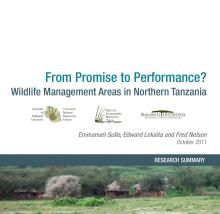/ library resources
Showing items 19 through 27 of 43.Between 2005 and 2009 the emergence of large-scale acquisitions of land or ‘land grabbing’ for production of food and energy feedstocks, and private forest plantations in developing countries, triggered various responses from global actors.
Training volunteers to help their communities defend their land rights has proved an effective approach for promoting land justice in Tanzania.
Land is one of the terrains of struggle for most rural women in Africa because of its importance in sustaining rural livelihoods, and social-cultural and geopolitical factors that hinder women from enjoying land rights.
Planning for climate resilience growth is increasingly important for the natural resource dependent economy of Tanzania.
The purpose of this assignment was to establish whether there is appetite to hold a public debate on how to realise better land‐based investments in Tanzania.
Climate change and its implications on development in Tanzania should not be understated or ignored. Instead, discussions on our changing climate should begin with the recognition that climate change is undermining efforts to eradicate poverty.
TNRF, UCRT and Maliasili Initiatives have published, From Promise to Performance?: Wildlife Mangement Areas in Northern Tanzania.
This preliminary study involved consultation of responsible district government officials and relevant Civil Society Organizations (CSOs) on various issues related to land and investments.
Administration of land in Tanzania is more decentralized from the president to the village level. The law gives power to village councils and village assemblies to administer village land.
Pagination
Land Library Search
Through our robust search engine, you can search for any item of the over 73,000 highly curated resources in the Land Library.
If you would like to find an overview of what is possible, feel free to peruse the Search Guide.








